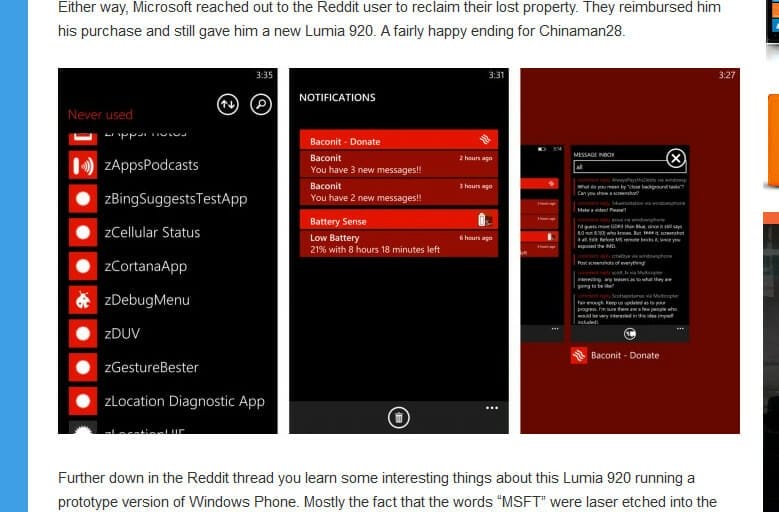Quick overview:

Surfaced on the net: The new Windows Phone 8.1 with "Cortana" app? Photo: wpcentral.com (screenshot)
A Nokia Lumia smartphone accidentally sold on Ebay contained an app that nobody knows about yet - and was supposed to remain secret. The story of this discovery reads suspiciously similar to the discovery of the redesigned iPhone 4 a few years ago. What is exciting, however, is that new versions of Windows - including Windows Phone 8 Blue - are getting a voice assistant like Apple's "Siri" or Google's "Now".
Whether the leak in June was intentional or a coincidence remains speculation, of course - you can read how the Nokia phone with the new version of Windows Phone came to the public's attention in this English-language article. The information behind it is certainly interesting: "zCortanaApp" - the name of the voice recognition app (see also image above) could be of central importance for what Microsoft is planning for the further development of its Windows product world.
As ZD-Net author Mary Jo Foley writes, Microsoft has already released some more information about this. The app (under the new Windows Phone 8 Blue) should be able to learn the search and usage behavior of its users and adapt accordingly. It should be more than just voice recognition, but serve as a "personal assistant"
In addition, Cortana is to be available across all Windows platforms - Windows, Windows Phone and also the Xbox are to be equipped with it (more information on Windows Phone).
What is behind "Cortana"?
The name comes from Microsoft's Xbox game series Halo. Cortana is an artificial intelligence - in the form of a scantily clad young woman. In Microsoft's software products, this intelligence will link the databases of several existing voice-based services - including voice recognition from Bing and the subsidiary TellMe.
Cortana will offer access to weather information, notifications, location data and location-based services, among other things. The technology that currently links information in the Bing search engine under the name "Satori" will probably be working in the background.
It is obvious that Microsoft is pursuing larger strategic goals with such cross-platform technology: back in July, outgoing CEO Steve Ballmer wrote in a memo:
"Our user interface is being intensively personalized, based on the already advanced, almost magical intelligence in our cloud services. These will learn more and more about people and the world over time. Our interface will natively support all our essential services, and it will seamlessly respond to what people ask. It will even anticipate what they need before they have to ask for it."
Two years earlier, Ballmer had already spoken about his vision of apps that could store and process more than just superficial information. He envisioned applications that would be able to collect and link the required information in response to a simple spoken command and then implement the command. Ballmer cited the printing of a flight ticket on command as an application scenario.
These are big promises that Ballmer is making. Whether Cortana will really be so revolutionary that it can anticipate user wishes - let's wait and see.
When is "Cortana" coming?
In order to drive forward the development of such applications, the software company merged its speech recognition development team with the Bing search engine team back in 2011.
The company is apparently working at full speed: Analysts expect the first version of Cortana as early as the beginning of 2014 - initially only for the USA - another 44 countries are to follow in the same year.
On Windows Tweaks you will find time-saving tech guides for PC, software & Microsoft. For a stress-free digital everyday life. Already we have been "tweaking" Windows since 1998 and just won't stop!



